Unit 2 I think that mooncakes are delicious!-Section B 1a-1d课件(共52张PPT)
文档属性
| 名称 | Unit 2 I think that mooncakes are delicious!-Section B 1a-1d课件(共52张PPT) |  | |
| 格式 | ppt | ||
| 文件大小 | 4.8MB | ||
| 资源类型 | 教案 | ||
| 版本资源 | 人教新目标(Go for it)版 | ||
| 科目 | 英语 | ||
| 更新时间 | 2022-09-13 16:16:27 | ||
图片预览

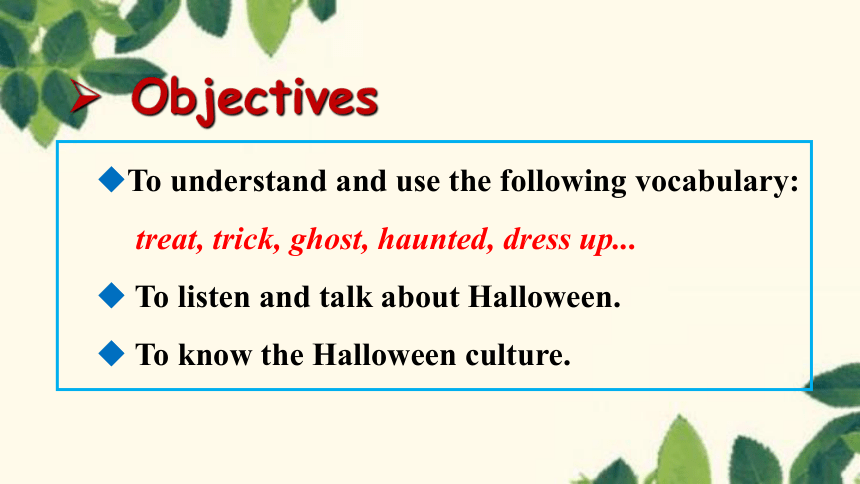
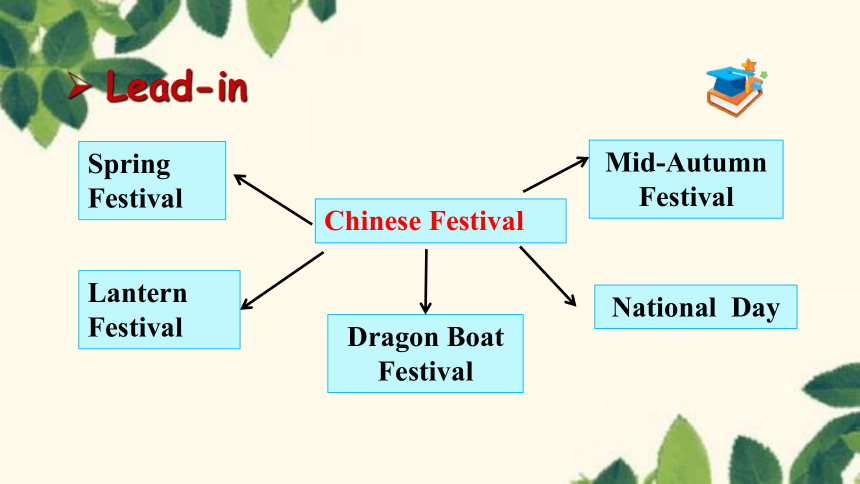
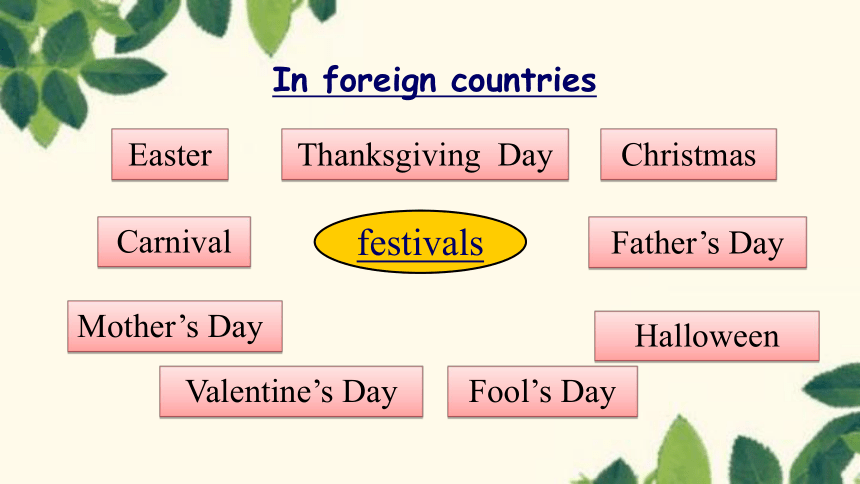
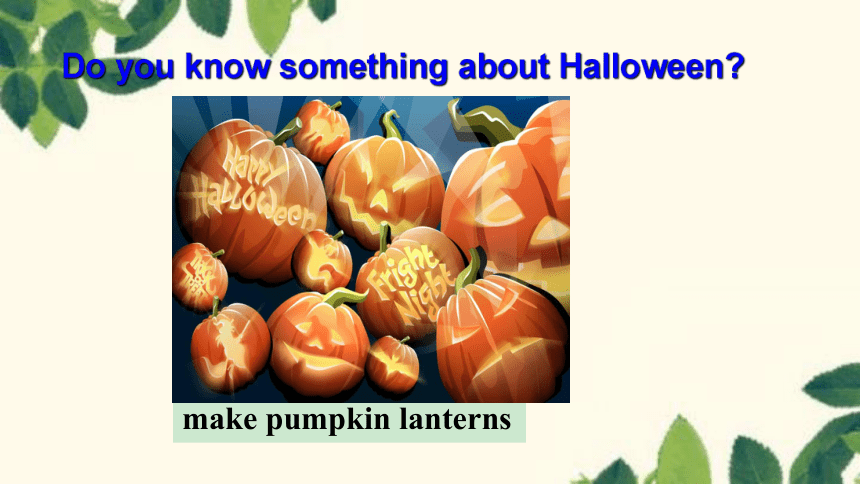
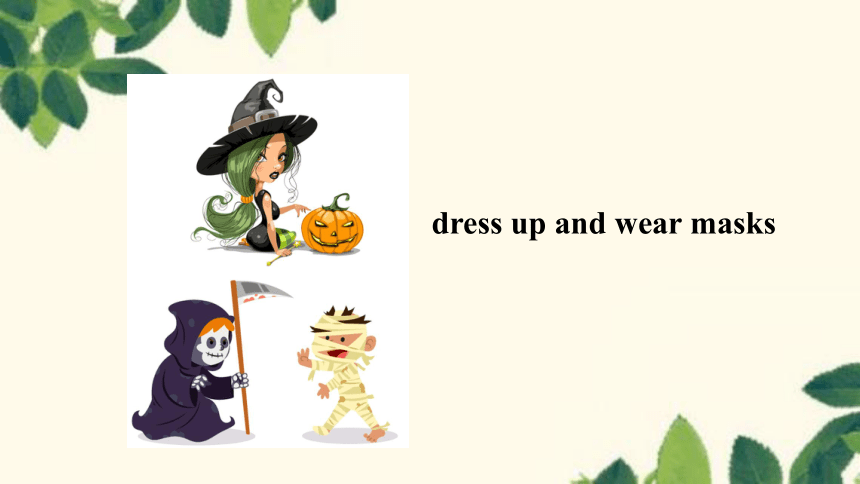
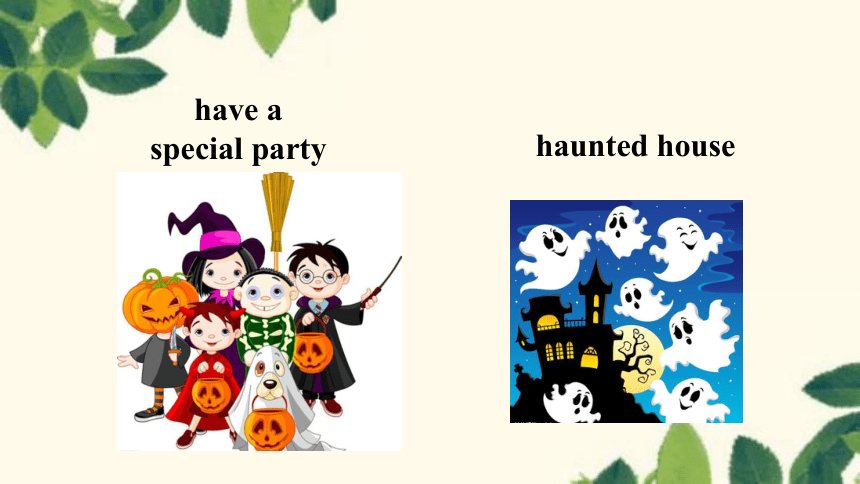
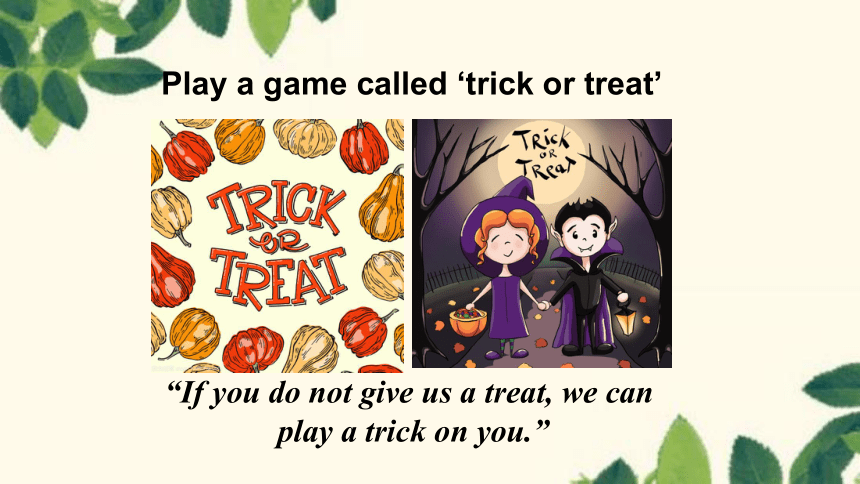

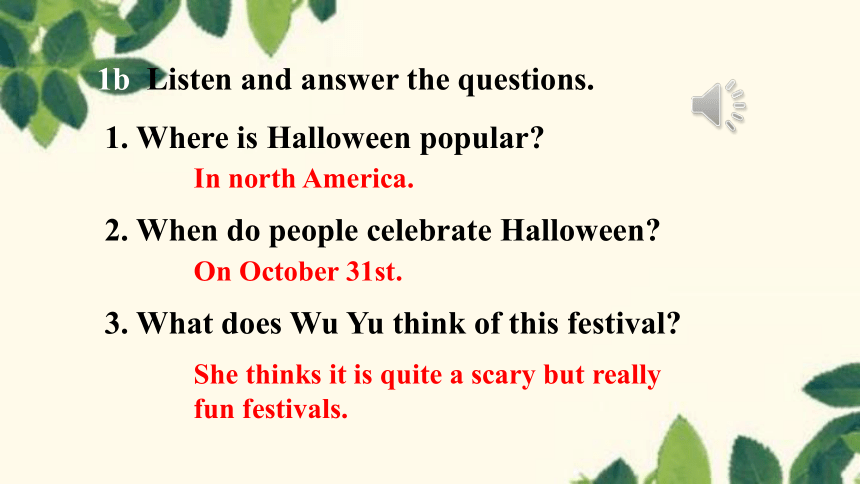
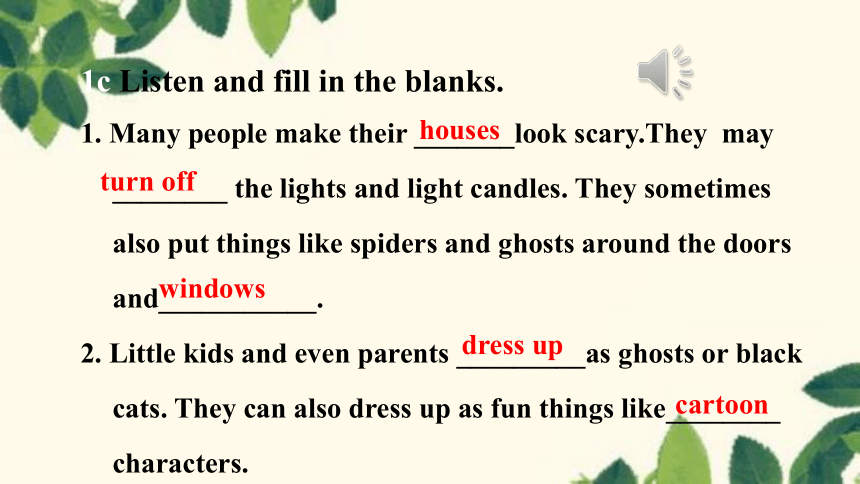
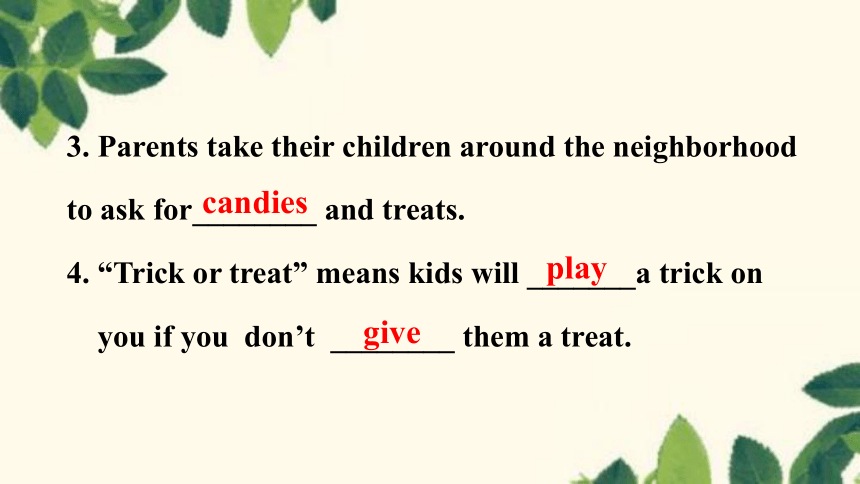
文档简介
(共52张PPT)
Section B 1a-1d
Objectives
To understand and use the following vocabulary:
treat, trick, ghost, haunted, dress up...
To listen and talk about Halloween.
To know the Halloween culture.
Spring Festival
Chinese Festival
Lantern Festival
Dragon Boat Festival
Mid-Autumn Festival
National Day
Lead-in
festivals
Christmas
Fool’s Day
Valentine’s Day
Carnival
Easter
Thanksgiving Day
Mother’s Day
Father’s Day
Halloween
In foreign countries
make pumpkin lanterns
Do you know something about Halloween
dress up and wear masks
have a special party
haunted house
Play a game called ‘trick or treat’
“If you do not give us a treat, we can
play a trick on you.”
scary dress up haunted house
black cat candy trick or treat
ghost October spider
1a Look at the pictures and words related to Halloween.
What do you think this festival is about
1b Listen and answer the questions.
1. Where is Halloween popular
2. When do people celebrate Halloween
3. What does Wu Yu think of this festival
In north America.
On October 31st.
She thinks it is quite a scary but really fun festivals.
1c Listen and fill in the blanks.
1. Many people make their _______look scary.They may ________ the lights and light candles. They sometimes also put things like spiders and ghosts around the doors and___________.
2. Little kids and even parents _________as ghosts or black cats. They can also dress up as fun things like________ characters.
houses
turn off
windows
dress up
cartoon
3. Parents take their children around the neighborhood to ask for________ and treats.
4. “Trick or treat” means kids will _______a trick on
you if you don’t ________ them a treat.
candies
play
give
1d Think about the Halloween activities that
interest you most. Discuss what you have
learnt with a partner.
A: What have you learned about Halloween
B: Oh, I know it’s a popular festivals in North America
and it’s on October 31st.
A: What do you like most about this festival
B: I think it’s fun to dress up as cartoon characters!
Oh, I know it’s a popular festival in North America and it’s on October 31st.
What have you learned about Halloween
Pairwork
I think it’s fun to dress up as cartoon characters!
What do you like most about this festival
Many people make their houses look scary. They turn off the lights and light candles.
What do people do on that day
They dress up as ghosts or black cats.
What do little kids dress up
Yes. Children ask their neighbours for candies and treats. If you don’t give them a treat, they will play a trick on you.
Do you know a game called “trick or treat”
Christmas Fourth Thursday in November
April Fool’s Day February 14th
Halloween April 1st
St. Valentine’s Day October 31st
Thanksgiving December 25th
Do you know when these special days are Try to match each day with the correct date.
Open your eyes
1.dress up 装扮;乔装打扮。
dress up 常与 as,in 连用构成短语:
dress up as… 意为“装扮/乔装打扮成……”
dress up in… 意为“穿上……”后接表示衣服或颜色
的名词。
He likes to dress up as a soldier. 他喜欢装扮成军人。
Language points
On Christmas Day we always dress up in red.
在圣诞节我们总是穿上红衣服。
辨析:dress, wear, put on, have on 与 be in
dress “给某人穿衣服”,其宾语是人或反身代词,不是
表示衣服等的名词。
wear“穿着;戴着”强调状态。
put on“穿上;戴着”强调动作。
have on“穿着;戴着”强调状态。不能用于被动语态。
be in“穿着;戴着”强调状态,通常接表示颜色的名词。
She dressed her son and then sent him to school.
她给儿子穿好衣服并送他去上学。
She wears red shoes.
她穿着红色的鞋子。
He put on his best clothes for the party.
为参加晚会他穿上了最好的衣服。
She had a beautiful new suit on.
她穿着一套漂亮的新衣服。
Who is the girl in red over there
那边穿红衣服的那个女孩是谁?
2.“Trick or treat” means kids will play a trick on
you if you don’t give them a treat.
(1)play a trick on 意为“捉弄”。
These children love playing tricks on their teacher.
这些孩子喜欢捉弄他们的老师。
(2) if 意为“如果”,此处用于引导条件状语从句,主句是一般将来时,从句则用一般现在时。
I will go home if it doesn’t rain tomorrow.
如果明天不下雨,我就回家。
1. 打扮得像鬼
2. 不招待就捣乱
3. 戏弄某人
4. 点蜡烛
5. 要糖果和招待
6. 招待某人
7. 对某人好/不好
8. 在北美洲
Exercises
dress up as ghosts
trick or treat
play a trick on
light candles
ask for candies and treats
give sb. a treat
treat sb. nicely/ badly
in North America
Ⅰ. 汉译英。
—Tom, do you know ___________
—In Beijing.
A. where did China held the 24th Winter Olympics
B. where China held the 24th Winter Olympics
C. where did China held the 24th Winter Olympics
2. —I don’ t know __________ we will go.
—Why not? We will go to the beach for a picnic.
A. where B. when C. how
B
A
Ⅱ. 单选。
3. —I don’t know _________ during the summer
vacation. Do you have any advice
—How about visiting Beijing International
Horticultural Expo(北京国际园艺博览会)
A. what should I do B. when should I go
C. what I should do D. when I should go
C
4. —What did Tom say to you just now, John
—He asked ___________.
A. why I am so happy today
B. what will I do for the weekend
C. Who did I play football with after school
D. if I could go to the movie with him tonight
5. —Dear, do you still remember __ one years ago
—To realize our dream!
A. why you came here B. why did you come here
C. how you came here D. how did you came here
D
A
1. 他喜欢装扮成军人。
2. 许多人使他们的房子看起来很吓人。
He likes to _____ _____ _____ a soldier.
Many people make their houses ______ _______.
3. 这些孩子喜欢捉弄他们的老师。
These children love _______ ______ _____ their teacher.
dress up as
look scary
playing tricks on
Ⅲ. 根据汉语提示,完成句子。
中考链接
– You’d better take an umbrella. The weather
report says it _____ in the afternoon.
– Thank you. I will put one in my bag.
A. will rain B. rains C. is raining
A
天气预报说今天下午会下雨,表示将来会下雨,用一般将来时。
Preview the next part.
Remember the new words and expressions.
Homework
To listen to 1c and 1d, then complete them.
To learn new words: pronounce, increase, speed, partner…
Objectives
Do you have difficulties in learning English
What things are difficult for you
Discussion
What’s your problem in learning English How do you solve them
I have difficulties in
learning English.
Can you help me
The difficulties he has in learning English.
New words: can’t pronounce some of the words
spell some English words
Speaking: be afraid to speak
Listening: can’t understand spoken English
Writing: can’t make complete sentences
Reading: read very slowly
Grammar: make mistakes
1a Learning English can be difficult. What things are
difficult for you Read the list. Check ( ) the
statements that are true for you.
____ I can’t pronounce some of the words.(v. 发音)
____ I can’t always understand spoken English.
____ I don’t know how to increase my reading speed.
____ I can’t spell some English words.
____ I often make mistakes in grammar.
(v. 增加;增长)
(n. 速度)
1b What other things are difficult for you
Make a list.
1. I don’t know enough words to write well.
2. ________________________________
3. ________________________________
4. ______________________________
5. ________________________________
can’t get the pronunciation right
be afraid people might laugh at me
forget a lot of new words
don’t get much writing practice
1c Paul finds it difficult to learn English. Listen and
complete the learning challenges he talks about.
1. He can’t get the__________________ right.
2. He___________ a lot of new words.
3. He can’t always_____________ when people talk to him.
4. He doesn’t get much___________ practice.
pronunciation
forgets
understand
writing
Challenges
1d Listen again. Complete the solutions.
1. ________________ can help.
He can always_____________________ in his notebook and study them at home.
He can_____________________________ to practice speaking.
He should find a _______ to practice writing.
Listening
write the new words
join an English language club
pen pal
Solutions
1e Role-play conversations using the information
in 1c and 1d.
① A: I don’t have a partner to practice English with.
B: Maybe you should join an English club.
② A: I always forget the new words.
B: You can write the new words in your notebook
and study them at home.
A: I can’t always understand when people talk to me.
B: Maybe you should join an English language club
to practice speaking.
A: I forget a lot of new words.
B: Maybe you should write the new words in your
notebook and study them at home.
Pair work
1.I often make mistakes in grammar.
mistake n. 错误;过失 make mistakes 犯错
Tom didn’t make a single spelling mistake in his composition. 汤姆在这篇作文里一个字也没拼错。
mistake vt. 弄错,误解
I mistook the number and went to the wrong room. 我记错号码, 走错了房间。
Language points
2. challenge n. 挑战
He wants a career that offers a challenge. 他想要一份有挑战性的事业。
vt. 向……挑战;对……提出异议
I challenged him to show his proof. 我要他拿出证据。
He challenged my view on that matter. 他就我对那件事的看法提出异议。
3. solution n. (问题、疑难等的) 解决;解答
It may take a long time to find a solution to the problem. 也许要花很长时间才能找到解决这个问题的办法。 The solution of the problem requires a lot of time. 解决这个问题需要很多时间。
4. Maybe you should join an English club.
join/join in/take part in
(1) join=be a member of 参加, 指加入某种组织,并成为其中的一员。
join the army / party 入伍/党 join the club 加入俱乐部
join in 后接活动名称
join sb. 加入到某个人群之中
Ⅰ. 用所给词的适当形式填空。
1. Sometimes, I can’t get the____________ (pronounce) right.
2. I don’t know how__________ (improve) my spoken English.
3. The more careful you are, the fewer_________ (mistake)
you’ll make.
4. You can find a pen pal to practice________ (write).
5. She can’t______ (spell) English words.
Exercises
pronunciation
to improve
mistakes
writing
spell
Ⅱ. 用方框中所给单词的适当形式填空。
We must learn to face the __________ in our life.
2. He has trouble in understanding _______ English.
3. Can you think of a good _______ to the problem
4. You can listen to the tapes to get much listening _______.
5. The more careful you are, the fewer _______ you’ll make.
solution, practice, mistake, spoken, challenges
challenges
spoken
solution
practice
mistakes
— Excuse me, can you teach me how to ______
this new word
— No problem. Look at my mouth and listen
carefully.
A. prove B. pronounce
C. prepare D. produce
B
中考链接
证明
准备
发音
生产
你能教给我这个新词怎么样……
— Miss Huang always advises us to practice
speaking English after class.
— She is right. Speaking is an important
language __________.
A. sign B. skill C. suggestion
符号
技能
建议
B
Review the new words and expressions you’ve learned today.
Preview the article How Can You Become a Successful Learner on page 6.
Homework
Section B 1a-1d
Objectives
To understand and use the following vocabulary:
treat, trick, ghost, haunted, dress up...
To listen and talk about Halloween.
To know the Halloween culture.
Spring Festival
Chinese Festival
Lantern Festival
Dragon Boat Festival
Mid-Autumn Festival
National Day
Lead-in
festivals
Christmas
Fool’s Day
Valentine’s Day
Carnival
Easter
Thanksgiving Day
Mother’s Day
Father’s Day
Halloween
In foreign countries
make pumpkin lanterns
Do you know something about Halloween
dress up and wear masks
have a special party
haunted house
Play a game called ‘trick or treat’
“If you do not give us a treat, we can
play a trick on you.”
scary dress up haunted house
black cat candy trick or treat
ghost October spider
1a Look at the pictures and words related to Halloween.
What do you think this festival is about
1b Listen and answer the questions.
1. Where is Halloween popular
2. When do people celebrate Halloween
3. What does Wu Yu think of this festival
In north America.
On October 31st.
She thinks it is quite a scary but really fun festivals.
1c Listen and fill in the blanks.
1. Many people make their _______look scary.They may ________ the lights and light candles. They sometimes also put things like spiders and ghosts around the doors and___________.
2. Little kids and even parents _________as ghosts or black cats. They can also dress up as fun things like________ characters.
houses
turn off
windows
dress up
cartoon
3. Parents take their children around the neighborhood to ask for________ and treats.
4. “Trick or treat” means kids will _______a trick on
you if you don’t ________ them a treat.
candies
play
give
1d Think about the Halloween activities that
interest you most. Discuss what you have
learnt with a partner.
A: What have you learned about Halloween
B: Oh, I know it’s a popular festivals in North America
and it’s on October 31st.
A: What do you like most about this festival
B: I think it’s fun to dress up as cartoon characters!
Oh, I know it’s a popular festival in North America and it’s on October 31st.
What have you learned about Halloween
Pairwork
I think it’s fun to dress up as cartoon characters!
What do you like most about this festival
Many people make their houses look scary. They turn off the lights and light candles.
What do people do on that day
They dress up as ghosts or black cats.
What do little kids dress up
Yes. Children ask their neighbours for candies and treats. If you don’t give them a treat, they will play a trick on you.
Do you know a game called “trick or treat”
Christmas Fourth Thursday in November
April Fool’s Day February 14th
Halloween April 1st
St. Valentine’s Day October 31st
Thanksgiving December 25th
Do you know when these special days are Try to match each day with the correct date.
Open your eyes
1.dress up 装扮;乔装打扮。
dress up 常与 as,in 连用构成短语:
dress up as… 意为“装扮/乔装打扮成……”
dress up in… 意为“穿上……”后接表示衣服或颜色
的名词。
He likes to dress up as a soldier. 他喜欢装扮成军人。
Language points
On Christmas Day we always dress up in red.
在圣诞节我们总是穿上红衣服。
辨析:dress, wear, put on, have on 与 be in
dress “给某人穿衣服”,其宾语是人或反身代词,不是
表示衣服等的名词。
wear“穿着;戴着”强调状态。
put on“穿上;戴着”强调动作。
have on“穿着;戴着”强调状态。不能用于被动语态。
be in“穿着;戴着”强调状态,通常接表示颜色的名词。
She dressed her son and then sent him to school.
她给儿子穿好衣服并送他去上学。
She wears red shoes.
她穿着红色的鞋子。
He put on his best clothes for the party.
为参加晚会他穿上了最好的衣服。
She had a beautiful new suit on.
她穿着一套漂亮的新衣服。
Who is the girl in red over there
那边穿红衣服的那个女孩是谁?
2.“Trick or treat” means kids will play a trick on
you if you don’t give them a treat.
(1)play a trick on 意为“捉弄”。
These children love playing tricks on their teacher.
这些孩子喜欢捉弄他们的老师。
(2) if 意为“如果”,此处用于引导条件状语从句,主句是一般将来时,从句则用一般现在时。
I will go home if it doesn’t rain tomorrow.
如果明天不下雨,我就回家。
1. 打扮得像鬼
2. 不招待就捣乱
3. 戏弄某人
4. 点蜡烛
5. 要糖果和招待
6. 招待某人
7. 对某人好/不好
8. 在北美洲
Exercises
dress up as ghosts
trick or treat
play a trick on
light candles
ask for candies and treats
give sb. a treat
treat sb. nicely/ badly
in North America
Ⅰ. 汉译英。
—Tom, do you know ___________
—In Beijing.
A. where did China held the 24th Winter Olympics
B. where China held the 24th Winter Olympics
C. where did China held the 24th Winter Olympics
2. —I don’ t know __________ we will go.
—Why not? We will go to the beach for a picnic.
A. where B. when C. how
B
A
Ⅱ. 单选。
3. —I don’t know _________ during the summer
vacation. Do you have any advice
—How about visiting Beijing International
Horticultural Expo(北京国际园艺博览会)
A. what should I do B. when should I go
C. what I should do D. when I should go
C
4. —What did Tom say to you just now, John
—He asked ___________.
A. why I am so happy today
B. what will I do for the weekend
C. Who did I play football with after school
D. if I could go to the movie with him tonight
5. —Dear, do you still remember __ one years ago
—To realize our dream!
A. why you came here B. why did you come here
C. how you came here D. how did you came here
D
A
1. 他喜欢装扮成军人。
2. 许多人使他们的房子看起来很吓人。
He likes to _____ _____ _____ a soldier.
Many people make their houses ______ _______.
3. 这些孩子喜欢捉弄他们的老师。
These children love _______ ______ _____ their teacher.
dress up as
look scary
playing tricks on
Ⅲ. 根据汉语提示,完成句子。
中考链接
– You’d better take an umbrella. The weather
report says it _____ in the afternoon.
– Thank you. I will put one in my bag.
A. will rain B. rains C. is raining
A
天气预报说今天下午会下雨,表示将来会下雨,用一般将来时。
Preview the next part.
Remember the new words and expressions.
Homework
To listen to 1c and 1d, then complete them.
To learn new words: pronounce, increase, speed, partner…
Objectives
Do you have difficulties in learning English
What things are difficult for you
Discussion
What’s your problem in learning English How do you solve them
I have difficulties in
learning English.
Can you help me
The difficulties he has in learning English.
New words: can’t pronounce some of the words
spell some English words
Speaking: be afraid to speak
Listening: can’t understand spoken English
Writing: can’t make complete sentences
Reading: read very slowly
Grammar: make mistakes
1a Learning English can be difficult. What things are
difficult for you Read the list. Check ( ) the
statements that are true for you.
____ I can’t pronounce some of the words.(v. 发音)
____ I can’t always understand spoken English.
____ I don’t know how to increase my reading speed.
____ I can’t spell some English words.
____ I often make mistakes in grammar.
(v. 增加;增长)
(n. 速度)
1b What other things are difficult for you
Make a list.
1. I don’t know enough words to write well.
2. ________________________________
3. ________________________________
4. ______________________________
5. ________________________________
can’t get the pronunciation right
be afraid people might laugh at me
forget a lot of new words
don’t get much writing practice
1c Paul finds it difficult to learn English. Listen and
complete the learning challenges he talks about.
1. He can’t get the__________________ right.
2. He___________ a lot of new words.
3. He can’t always_____________ when people talk to him.
4. He doesn’t get much___________ practice.
pronunciation
forgets
understand
writing
Challenges
1d Listen again. Complete the solutions.
1. ________________ can help.
He can always_____________________ in his notebook and study them at home.
He can_____________________________ to practice speaking.
He should find a _______ to practice writing.
Listening
write the new words
join an English language club
pen pal
Solutions
1e Role-play conversations using the information
in 1c and 1d.
① A: I don’t have a partner to practice English with.
B: Maybe you should join an English club.
② A: I always forget the new words.
B: You can write the new words in your notebook
and study them at home.
A: I can’t always understand when people talk to me.
B: Maybe you should join an English language club
to practice speaking.
A: I forget a lot of new words.
B: Maybe you should write the new words in your
notebook and study them at home.
Pair work
1.I often make mistakes in grammar.
mistake n. 错误;过失 make mistakes 犯错
Tom didn’t make a single spelling mistake in his composition. 汤姆在这篇作文里一个字也没拼错。
mistake vt. 弄错,误解
I mistook the number and went to the wrong room. 我记错号码, 走错了房间。
Language points
2. challenge n. 挑战
He wants a career that offers a challenge. 他想要一份有挑战性的事业。
vt. 向……挑战;对……提出异议
I challenged him to show his proof. 我要他拿出证据。
He challenged my view on that matter. 他就我对那件事的看法提出异议。
3. solution n. (问题、疑难等的) 解决;解答
It may take a long time to find a solution to the problem. 也许要花很长时间才能找到解决这个问题的办法。 The solution of the problem requires a lot of time. 解决这个问题需要很多时间。
4. Maybe you should join an English club.
join/join in/take part in
(1) join=be a member of 参加, 指加入某种组织,并成为其中的一员。
join the army / party 入伍/党 join the club 加入俱乐部
join in 后接活动名称
join sb. 加入到某个人群之中
Ⅰ. 用所给词的适当形式填空。
1. Sometimes, I can’t get the____________ (pronounce) right.
2. I don’t know how__________ (improve) my spoken English.
3. The more careful you are, the fewer_________ (mistake)
you’ll make.
4. You can find a pen pal to practice________ (write).
5. She can’t______ (spell) English words.
Exercises
pronunciation
to improve
mistakes
writing
spell
Ⅱ. 用方框中所给单词的适当形式填空。
We must learn to face the __________ in our life.
2. He has trouble in understanding _______ English.
3. Can you think of a good _______ to the problem
4. You can listen to the tapes to get much listening _______.
5. The more careful you are, the fewer _______ you’ll make.
solution, practice, mistake, spoken, challenges
challenges
spoken
solution
practice
mistakes
— Excuse me, can you teach me how to ______
this new word
— No problem. Look at my mouth and listen
carefully.
A. prove B. pronounce
C. prepare D. produce
B
中考链接
证明
准备
发音
生产
你能教给我这个新词怎么样……
— Miss Huang always advises us to practice
speaking English after class.
— She is right. Speaking is an important
language __________.
A. sign B. skill C. suggestion
符号
技能
建议
B
Review the new words and expressions you’ve learned today.
Preview the article How Can You Become a Successful Learner on page 6.
Homework
同课章节目录
- Unit 1 How can we become good learners.
- Section A
- Section B
- Unit 2 I think that mooncakes are delicious!
- Section A
- Section B
- Unit 3 Could you please tell me where the restroom
- Section A
- Section B
- Unit 4 I used to be afraid of the dark.
- Section A
- Section B
- Unit 5 What are the shirts made of?
- Section A
- Section B
- Review of Units 1-5
- Unit 6 When was it invented?
- Section A
- Section B
- Unit 7 Teenagers should be allowed to choose their
- Section A
- Section B
- Unit 8 It must belong to Carla.
- Section A
- Section B
- Unit 9 I like music that I can dance to.
- Section A
- Section B
- Unit 10 You're supposed to shake hands.
- Section A
- Section B
- Review of Units 6-10
- Unit 11 Sad movies make me cry.
- Section A
- Section B
- Unit 12 Life is full of the unexpected
- Section A
- Section B
- Unit 13 We're trying to save the earth!
- Section A
- Section B
- Unit 14 I remember meeting all of you in Grade 7.
- Section A
- Section B
- Review of Units 11-14
